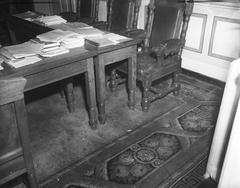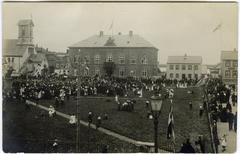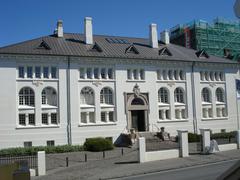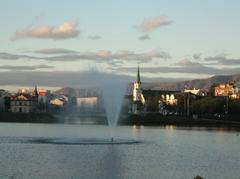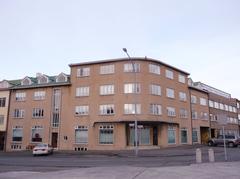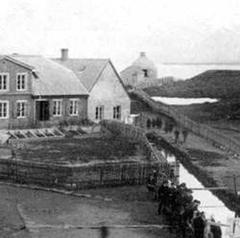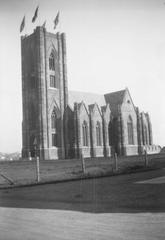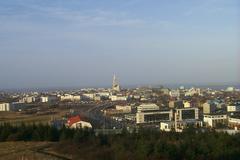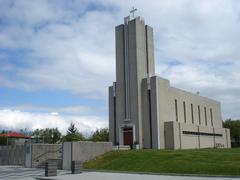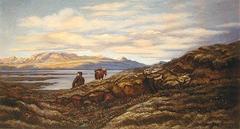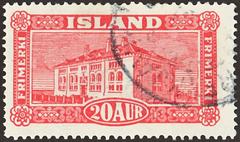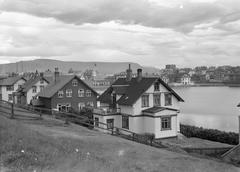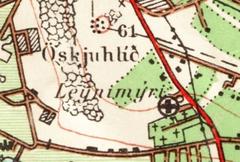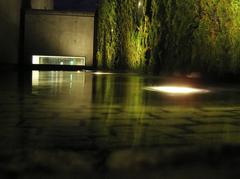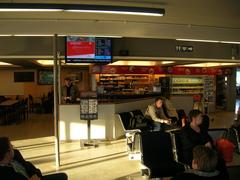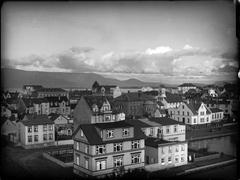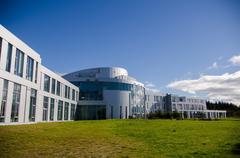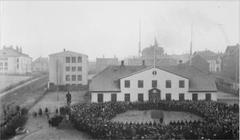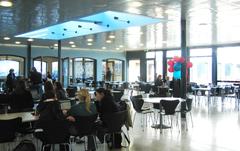Laugardalsvöllur Visiting Hours, Tickets, and Guide to Reykjavík Historical Sites
Date: 14/06/2025
Introduction: Laugardalsvöllur’s Role in Reykjavík’s Heritage
Laugardalsvöllur, situated in the verdant Laugardalur district of Reykjavík, Iceland, is more than just the country’s premier football stadium—it’s a symbol of national pride and a testament to the city’s sporting and cultural evolution. Opening its gates in 1959, the stadium has grown alongside Reykjavík, hosting everything from historic international matches to major concerts and community events (Wikipedia; My Sports Tourist).
Located just 3 kilometers from Reykjavík’s city center, Laugardalsvöllur is easily accessible via public transport, taxi, or a picturesque walk through the Laugardalur valley—a district renowned for its geothermal pools, botanical gardens, and family-friendly attractions (Nomad Epic). Visitors can immerse themselves in the electric atmosphere of Icelandic football, highlighted by the famous “Viking Clap,” and enjoy the diverse experiences offered by the stadium and its surroundings.
This guide details Laugardalsvöllur’s rich history, current visiting hours, ticketing information, accessibility, ongoing renovations, and its place within the broader context of Reykjavík’s historical and cultural attractions. For up-to-date information on events and tickets, refer to official sources like the Football Association of Iceland (KSÍ) and Visit Reykjavík.
Contents
- Laugardalsvöllur: History & Significance
- Construction and Development Timeline
- Modernization and Future Plans
- Visitor Information: Hours, Tickets, Accessibility
- Stadium Facilities & Match-Day Guide
- Nearby Attractions in Laugardalur
- Annual Events & Festivals
- Practical Tips for Visitors
- Frequently Asked Questions
- Additional Resources
Laugardalsvöllur: History & Significance
Early Vision and Construction
The idea for a major sporting venue in Laugardalur dates back to 1871, but real momentum began in the 1940s when Reykjavík’s town council established a committee to develop the area for sports and recreation (Wikipedia). Construction began in the 1950s, with the first match taking place in 1957 and the official opening in 1959 (My Sports Tourist). Initially, the stadium had a single stand, reflecting both limited resources and the modest scale of Icelandic football at the time.
Evolution and Expansion
Laugardalsvöllur quickly became the home of the Iceland national football team and a central venue for major sporting and cultural events. The stadium underwent significant expansion in 1997 with the addition of a second stand, increasing capacity and improving facilities (Football Tripper). A major renovation in 2006 brought a modern cantilevered roof to the main stand (Wikipedia). Today, the stadium seats about 9,800 spectators, with former provisions for temporary expansion now restricted by FIFA standards.
National Symbol and Cultural Hub
Beyond sports, Laugardalsvöllur is a symbol of Icelandic unity and resilience. The stadium has hosted historic qualifiers for UEFA Euro 2016 and the 2018 FIFA World Cup, along with legendary concerts like Guns N’ Roses in 2018 (Wikipedia; Evendo). Its atmosphere is renowned, particularly during international fixtures when the “Viking Clap” reverberates around the stands.
Construction and Development Timeline
- 1950s: Construction begins; first match played in 1957.
- 1959: Official opening; stadium becomes home to Iceland’s national team.
- 1997: Second stand added, increasing capacity and amenities.
- 2006: Major renovation with new roof and upgraded facilities.
- 2024 Onwards: Modernization projects begin, including hybrid grass and under-soil heating (Reykjavik.is).
Modernization and Future Plans
As Iceland’s football profile rises, Laugardalsvöllur is undergoing significant upgrades to meet international standards and future needs. In 2024, the government and city committed substantial funding for renovations, including hybrid grass and underground heating, to allow for year-round use (AFL Architects).
A strategic assessment led by AFL Architects recommends constructing a new 15,000-seat stadium with an openable roof and full UEFA Category 4 compliance. Sustainable features such as geothermal energy integration are prioritized. The project is under governmental review, with the aim of supporting Iceland’s ongoing football success and enhancing visitor experience (AFL Architects; Reykjavik.is).
Visitor Information: Hours, Tickets, and Accessibility
Visiting Hours
- Match Days & Events: Stadium is open to ticket holders.
- Non-Event Days: Guided tours may be available by prior arrangement through KSÍ.
- General Hours: Check the official KSÍ website or Visit Reykjavík for up-to-date schedules.
Tickets
- Purchase Online: Via KSÍ, authorized vendors, or at the stadium box office.
- Pricing: Varies by event; high-demand matches often sell out quickly.
- Concerts & Special Events: Tickets sold via event organizers’ platforms.
Accessibility
- Wheelchair-accessible seating and restrooms are available.
- Accessible parking spaces provided.
- Staff are available to assist visitors with special needs; it is recommended to contact the stadium in advance for specific arrangements.
Stadium Facilities & Match-Day Guide
Seating & Amenities
- Capacity: Approximately 9,800 all-seater.
- Stands: Combination of covered and open seating; main stand offers weather protection.
- Food & Beverage: Event days feature kiosks with Icelandic snacks (try the pylsur!), beverages, and merchandise stands.
- Restrooms: Well-maintained and accessible.
Match-Day Experience
- Atmosphere: The stadium comes alive with the “Viking Clap” and enthusiastic local support.
- Entry: Arrive at least 45 minutes before kick-off for security checks and to soak in the pre-match buzz.
- Safety: Strict protocols in place; prohibited items include large umbrellas, flares, and outside food/drinks.
- Family-Friendly: The venue maintains a safe, welcoming atmosphere for all ages.
Nearby Attractions in Laugardalur
Laugardalsvöllur sits within Reykjavík’s Laugardalur district, a recreational hub featuring:
- Laugardalshöll Arena: Indoor sports and concerts.
- Laugardalslaug Pool: Iceland’s largest geothermal pool.
- Reykjavík Botanical Garden: Open year-round, free entry.
- Family Park & Zoo: Icelandic animals and rides, open seasonally.
- Ice Rink: Public skating sessions available.
- Art Museums: Ásmundarsafn and Sigurjón Ólafsson Museum.
All are within walking distance and accessible via city bus (routes 11, 12), bike, or car (Nomad Epic; Guide to Iceland).
Annual Events & Festivals
- Iceland’s National Day (June 17): Parades, concerts, and family activities (Center Hotels).
- Secret Solstice Festival: International music acts under the midnight sun (Nordic Visitor).
- LÓA Music & Food Festival: Live performances and Icelandic cuisine.
- Reykjavík Fringe Festival: Arts and cultural events citywide.
- Fishermen’s Day: Maritime heritage celebrations.
Practical Tips for Visitors
- Weather: Reykjavík’s weather is unpredictable; dress in layers and bring waterproof gear.
- Transport: Public transport or cycling is recommended during major events; parking is limited and paid near attractions.
- Tickets: Buy in advance, especially for international matches and concerts.
- Reykjavík City Card: Offers discounts or free entry to attractions in Laugardalur.
Frequently Asked Questions
Q: How do I buy tickets for Laugardalsvöllur events?
A: Purchase online at KSÍ or from event organizers; box office sales are available on event days.
Q: What are the stadium’s visiting hours?
A: Open during events; guided tours by appointment—always check official websites for current schedules.
Q: Is Laugardalsvöllur accessible for wheelchair users?
A: Yes, with accessible entrances, seating, and restrooms.
Q: Are there guided tours of the stadium?
A: Yes, bookable through KSÍ or local tourism offices.
Q: What else can I do nearby?
A: Visit the Laugardalslaug pool, botanical garden, zoo, and local museums.
Additional Resources
- Football Association of Iceland (KSÍ)
- Official Ticketing Site
- Visit Reykjavík
- Laugardalsvöllur on Google Maps
- AFL Architects Laugardalsvöllur Project
- Nomad Epic Guide to Laugardalur
- Guide to Iceland: Laugardalur
- Evendo Laugardalsvöllur
Conclusion
Laugardalsvöllur stands at the crossroads of Icelandic tradition and modernity. As the nation’s football heart, it offers visitors an authentic experience of Icelandic sport, culture, and hospitality. With ongoing upgrades and ambitious plans for a new stadium, the venue’s future is as dynamic as its storied past. Pair your visit with explorations of Laugardalur’s pools, gardens, and museums, and immerse yourself in Reykjavík’s vibrant community.
For the latest updates, ticket information, and event schedules, use official sources and consider leveraging digital tools like the Audiala app for real-time news and personalized visitor tips.
Image: Laugardalsvöllur Stadium, a must-visit historic sports venue in Reykjavík.

